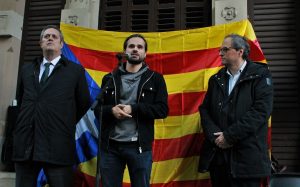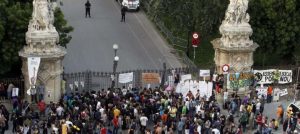Translated from the article by Barbaria:
Ni rojigualdas ni esteladas. ¡Por la independencia de clase contra toda nación!
For explaining the nature of the so-called catalan independentist process there’s no better image than the election of Quim Torra as president of the Generalitat. Self-determination and the freedom to vote has ended up putting an all-out admirer of Miquel Badia, one of the worst torturers and killers of the proletariat in the revolutionary Catalonia of the 30’s, at its helm. (The homage made to the Badia brothers on the part of Junqueras and Torra serves as testimony).

Quim Torra (right), current president of the Catalan Parlament at an act of homage to the proto-fascist Badia brothers
There’s no contradiction in all of this. In the end of the story, the freedom to vote has always meant the freedom to become massacred by our own bourgeoisie. This aspect of democracy has always revealed itself as an indispensable instrument for crushing the proletariat in struggle. To cite overly plentiful well known examples, the repression and massacres directed by Azaña (Casas Viejas, Arnedo, Alt Llobregat, January of ’33…) up to that of the para-police forces of the ERC directed by Badia, reveal this reality to us.
Another good image for explaining this whole process is the assault on Parliament in 2011, in which Artur Mas had to arrive in helicopter to the parliament floor, and after which eight people were condemned to many years of prison. In 2015, the same year in which the beginning of the independence process was declared, the catalan bourgeoisie applauded the Supreme Tribunal for its decision to condemn the accused to prison. Today, almost three years later, that same bourgeoisie is put on trial by the same Supreme Tribunal and it screams to the heavens, thousands of people take to the streets indignantly and here between Albert Rivera and Anna Gabriel, between Pedro Sánchez and Oriol Junqueras, between Pablo Iglesias and Puigdemont, one can no longer know who is more democratic, nor who best defends the sacrosanct legality and human rights. But there’s something evident and fundamental, the social protest which questioned the parliament in 2011 was displaced by a movement which did the exact opposite, defending it.

Protesters block access to the parliament during the “anti-austerity” protests of May 2011
Those two images put the cards on the table. If it’s necessary to remind, the catalan Govern is as brutal as the Central Government in the moment of repressing us. If the police and judicial intervention of the spanish State in these months has the rancid odor of españolist centralism, if the spanish bourgeoisie has the blood of hundreds of thousands of proletarians on its hands, the catalan bourgeoisie doesn’t remain far behind either. Between the catalan bourgeoisie and the spanish, there’s no lesser evil. When we fight against the misery which is imposed on us, the repression of the first is as ferocious as that of the second.
In this form, the process which opened up in September 2017 shows itself clearly as that which it always was: a terrible recuperation of the struggle of the proletariat in benefit to the competition between two bourgeoisies, the catalan and that of the spanish State. The polarization which we are seeing can’t be separated from this fact. All nationalism divides and separates our class and in this sense is functional for the dominion of capital.
It divides our class into patriots and charnegos 1 , into maulets and botiflers 2, catalans and traitors, constitutionalists and separatists. The categories of the ones and the others are, not coincidentally, the two faces of the same coin. Since both nationalisms – like all nationalisms – move within the categories of capital, all claim themselves to be democratic, defenders of the vote and the law, of the popular and national sovereignty. All reduce human election to citizenry and to the vote.
Democracy and its nations are ultimately useful for that. In the end of the story, the nation is not an entity in itself, funded in some remote historical and cultural origins of a land in harmony, unfortunately subjected to a dark central State. The nation is simply one of the fictitious communities which capitalism needs in order to impose itself as a real community of money, as a community of commodities and human beings commodified, bought, used and thrown away for the healthy growth of international capitalism. The nations appear with the violent expropriation of our means of living and the imposition of wage labor. The nation, democracy, citizenry are the form in which a society of beings who are atomized and in constant competition among themselves for a miserable salary, an always excessive rent, or a parking place, can be regulated and maintain a pacific appearance in the war of all against all. It’s also the way in which the bowed head of the proletariat is guaranteed when the belt must be tightened, when the national economy must be saved, or simply to impose a war economy and use us as cannon fodder for the benefit of one fraction of the international bourgeoisie against another.
Like so, the more that the contradictions of capitalism advance, the more that its wars, its social cutbacks, its state terrorism multiply, the more necessarily that nationalism becomes a form of holding up that which is disintegrating. From Trump to Rojava, from Brexit to the 5 Star Movement, from Syriza-ANEL to the Hungarian Civic Union, the nation becomes an increasingly more recurrent response for recuperating the proletarian rage against this system of misery.
This is at the same time the cause and effect of our weaknesses as proletarians. The difficulty of recognizing that our necessities and our interests are the same as those of the proletariat in other regions is one of the greatest obstacles which impedes us from fighting against our exploitation. To impede this recognition, at times we are told that what we see in other places are farmers struggles, at times that they are third-worldist struggles, or struggles against the imperialism of this country or against the dictatorship of that one, other times they are simply called hunger revolts. In the last decades our class has lived through insurrectional explosions in different territories of the planet, but the difficulty of seeing itself as the same has left it isolated, vulnerable to the repression of the international bourgeoisie and recuperable by the social democracy, which always lends a hand to the defense of the home economy once the calm as been imposed. Nationalism is born from this difficulty [of the proletariat] in recognizing itself as an international class, and it reinforces it. In the same manner that there’s no state which doesn’t reproduce and manage our misery in this system (be it called social, worker or confederated), there’s no defense of the nation that doesn’t flow into imperialist war and state terrorism. National independence is always the independence of the national bourgeoisie. the defense of the nation is always the preparation for the war against other nations. Kurdish nationalism, the great ally of the United States in the massacre of the proletariat in all of Kurdistan and in Syria, serves as an example.
This is something that a substantial part of the “anarchist” milieu has not known how to perceive. A prisoner of opportunism, it rushed behind the nationalist entanglement with the same and already quite hackneyed arguments as always: It’s necessary to be concrete, we must intervene, it’s a dynamic which could exceed its limitations, let’s go with our flags, we can make an influence. Meaning, the hackneyed possibilism of the lesser evil, the “argument” that the people are in the street without asking themselves what they are doing in the street, the demagogy that to not participate would be to stay in one’s marble tower – as if the only thing that could be done is join up with that nationalist current and that the critique of it was not the most coherent action. Who cares if the history of our class has demonstrated the contrary thousands of times. They even went so far as to call and support a general strike on the 3rd of October which would ultimately serve the fortification of catalan nationalism in its struggle against the spanish bourgeoisie and State. They played the sad role of useful idiots. And the thing is, one can’t maintain communist and anarchist positions as if they were some kind of principles suspended in the void. Our positions are not a series of bombastic declarations, but an expression of the real movement of our class, from the lessons which we can extract from the processes of revolution and counterrevolution in which our class has tried to destroy Capital. Our class is worldwide and has a history, a historical thread and a future. To disavow that thread of the past and future, to remain in the photography of the present and in the reduced local space, is synonymous with ideology, with condemning yourself to commit the same errors which our ancestors committed, with limiting yourself, independently from the will, to be appendages of capital.
On the contrary, the struggle of our class has always had an anti-national character, because it has seen itself obliged to break from the illusion that there’s something that unites us to those that benefit directly from our exploitation, and because in the process of struggle we recognize those that combat against the same enemies and for the the same necessities as class siblings. The proletariat has no country, because it’s a commodity in every location. Fighting against our exploitation means fighting against every State, against every nation and all their representatives, fighting as a worldwide class against a capitalism that is necessarily worldwide. For this reason the defense of the historical slogan of the proletariat, its revolutionary defeatism, that the enemy is in our own country and it’s our bourgeoisie, is so important. In fighting against “our bourgeoisie” we fight against all the bourgeoisies, against every State, against every nation.
As such, to the demand of catalan independence the proletarians in struggle can only give one response, the same that we have needed to give in every region, in every epoch: class independence for the abolition of capital and of the State on a worldwide level.
1. A depreciative catalan colloquialism for residents in catalonia of ethnic “spanish” origin.
2. Terms referring originally to the two opposing camps in the spanish war of succession (1701–1714), Maulets were the Valencian partisans of Charles VI of the Habsburgs while the Botiflers suported Philip V of the Bourbons.